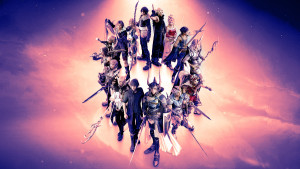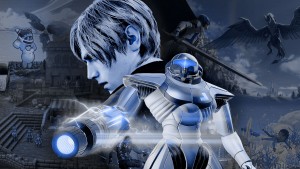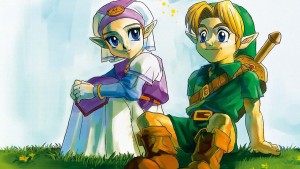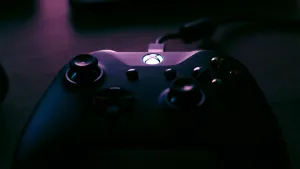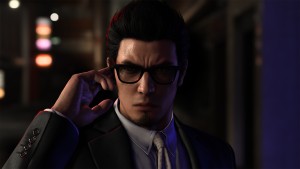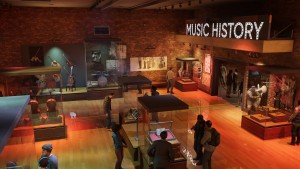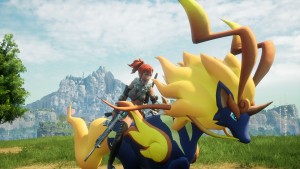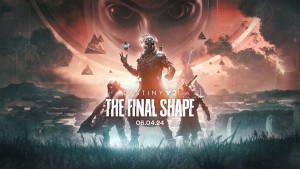
The Dillon games represent a rarity in Nintendo’s library. Its star, Dillon, lives in a world ravaged by aliens, and he takes many of his thematic cues from Mad Max: Fury Road. Dillon’s Dead-Heat Breakers opens with an 18-wheeler truck race across an apocalyptic desert, and he spends the rest of the story begrudgingly putting his life on the line for others without saying a single word. His trilogy stands apart from other 3DS (and Nintendo-published) games, but lacks confidence in the player, which leads to frustration alongside the moments of extreme speed and action.
Like the previous two Dillon games on 3DS, Dead-Heat Breakers’ genre is tricky to classify. It has elements of tower defense along with brawler combat, and it even includes some racing. The typical level begins with the player assigning hired helpers to man turrets on a large map. After that, the evil Grock aliens begin to descend and Dillon can roll at high speeds across the map to meet the enemy head on while the turrets help out. When Dillon encounters an enemy on the map, you are transported to a separate screen, a bit like an RPG, to engage in claw-to-claw brawler combat.
After you have thinned the enemy numbers, (and the timer has nearly expired) the bad guys convert to vehicles, and a high-speed chase ensues. This is where Dead-Heat Breakers shines the strongest. Chasing down enemies and slamming into them or jumping up in the air and swiping them with your claws as you speed along a track feels great. The large battle leading to each race is consistently intense thanks to the ever-present timer and fun-to-use combat controls. Dead-Heat Breakers abandons the touch-screen controls of previous two games, and it gives you far more control over the fight.
In this story, Dillon and his squirrel pal Russ work to help an animal version of your Mii. Aliens have covered your town with a giant impenetrable bubble, and Russ has agreed to build you a massive weapon to break through – as long as you collect materials from neighboring towns who also need help pushing back against the alien threat. Making your way through the game and watching the weapon be built piece by piece is rewarding, but the story does little to expand, even if the finale does deliver as an exciting action set piece.
Between these battles, you can play minigames (like forgettable-but-profitable time-trial races) to raise funds to hire your helpers. You can also sort trash or play a shooter at an arcade. To my surprise, the best minigame is the one where you run a store. In the morning, you select a few items to sell, neatly arrange them on a shelf, and then ring up each customer at checkout. Helping customers and generally simulating the retail experience is supremely satisfying. You only have time for a certain number of minigames each day, but I would always beeline to the store every morning.
The mechanics of the minigames and the core action sequences are satisfying, but Dead-Heat Breakers is brought down tremendously by how time-consuming it is to instigate every task. For example, the helpers you need to hire all sit around a hotel lobby waiting for you to approach them. They are pulled from your friends and Mii lists, which makes the early hiring process slightly more emotional than just statistical comparisons, but it doesn’t take long to build a large enough bank that you will just hire everyone. It ends up being an uninteresting and time-consuming barrier to get to the action when you need to click through 10 conversations with characters you’ve already spoken to for previous missions.
Every battle also includes new enemies, which is great for mixing up the action, but it comes at the cost of hearing Russ talk with each town’s leaders at length about the new enemy types with dialogue that creeps across the screen without the option to speed it up. The information they surface could easily be figured out just by encountering the new enemy types in the field. It means the barrier to every battle is an overlong spoken tutorial that only gets more and more frustrating with each conversation.
You are also occasionally required to replay levels to get necessary resources you may have missed the first time. Mercifully, you can skip the Russ dialogue in these situations, but you still must go through the hiring process, and replaying a scenario you already completed is always a headache. I had to play the penultimate level three times in a row to unlock the final battle, and that sucked.
For all my frustration with unwelcome tutorials before every level, slow speech, having to replay levels, and hiring helpers, I enjoyed the core action and running my store. The muck you must wade through before you get to the action is unavoidable, but when you do finally get through, it’s compelling. Speeding around the levels as Dillon, slamming into enemies and pulling off last-second saves as animal versions of my friends and family cheer me on is exhilarating.
